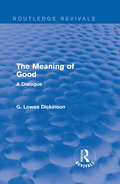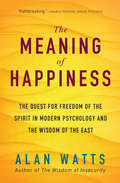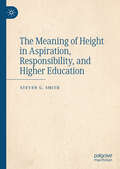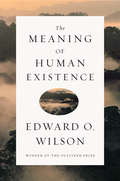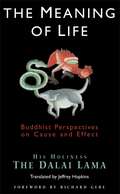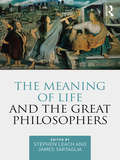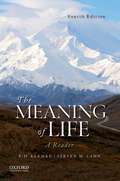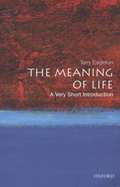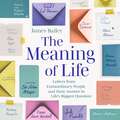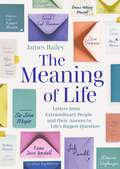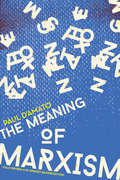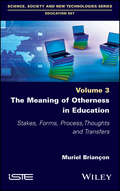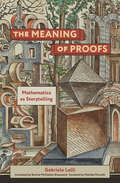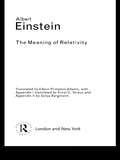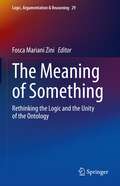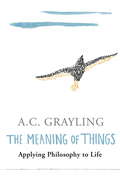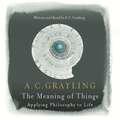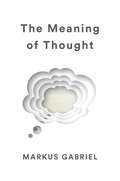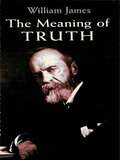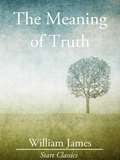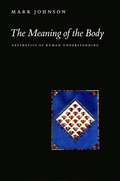- Table View
- List View
The Meaning of Good: A Dialogue (Routledge Revivals: Collected Works of G. Lowes Dickinson)
by G. Lowes DickinsonFirst published in 1937, this book presents itself as a philosophic dialogue, starting with the diversity of men’s ideas about Good. In the first part, it considers the creation and criteria of Good and its relation to truth, pleasure and happiness. In the second part, the book examines some kinds of Good, pointing out their defects and limitations, and suggesting the character of Good which we might hold to be perfect. The topic of the book is treated both philosophically and practically making it intriguing reading.
The Meaning of Happiness: The Quest for Freedom of the Spirit in Modern Psychology and the Wisdom of the East
by Alan WattsDeep down, most people think that happiness comes from having or doing something. Here, in Alan Watts&’s groundbreaking third book (originally published in 1940), he offers a more challenging thesis: authentic happiness comes from embracing life as a whole in all its contradictions and paradoxes, an attitude that Watts calls the &“way of acceptance.&” Drawing on Eastern philosophy, Western mysticism, and analytic psychology, Watts demonstrates that happiness comes from accepting both the outer world around us and the inner world inside us — the unconscious mind, with its irrational desires, lurking beyond the awareness of the ego. Although written early in his career, The Meaning of Happiness displays the hallmarks of his mature style: the crystal-clear writing, the homespun analogies, the dry wit, and the breadth of knowledge that made Alan Watts one of the most influential philosophers of his generation.
The Meaning of Height in Aspiration, Responsibility, and Higher Education
by Steven G. SmithThe Meaning of Height takes seriously the traditional figure of “higher life” for intrinsically preferable manners of living. Reworking the Platonic model of ascent to the ideal and descent to responsible engagement with the world, The Meaning of Height lays out concrete possible itineraries of reaching (upward to new acquisitions of personal capacity) and righting (downward from prompts for good order), showing connections between individual and social fulfillment. By focusing on our diversely demanding encounters with the interesting, the important, and the transcendent, the book strikes a counterpoint to the commonly homogenized conception of personal “happiness.” It also counters illiberal views of higher education with a Humboldtian vitality argument for a meaningfully “high” higher education geared to full development of human faculties, a level of education to which the disciplines of philosophy and religious studies make essential contributions. The book concludes by considering the essential role of this sort of higher education in democratic societies.
The Meaning of Human Existence
by Edward O. WilsonNational Book Award Finalist. How did humanity originate and why does a species like ours exist on this planet? Do we have a special place, even a destiny in the universe? Where are we going, and perhaps, the most difficult question of all, "Why?" In The Meaning of Human Existence, his most philosophical work to date, Pulitzer Prize-winning biologist Edward O. Wilson grapples with these and other existential questions, examining what makes human beings supremely different from all other species. Searching for meaning in what Nietzsche once called "the rainbow colors" around the outer edges of knowledge and imagination, Wilson takes his readers on a journey, in the process bridging science and philosophy to create a twenty-first-century treatise on human existence--from our earliest inception to a provocative look at what the future of mankind portends. Continuing his groundbreaking examination of our "Anthropocene Epoch," which he began with The Social Conquest of Earth, described by the New York Times as "a sweeping account of the human rise to domination of the biosphere," here Wilson posits that we, as a species, now know enough about the universe and ourselves that we can begin to approach questions about our place in the cosmos and the meaning of intelligent life in a systematic, indeed, in a testable way. Once criticized for a purely mechanistic view of human life and an overreliance on genetic predetermination, Wilson presents in The Meaning of Human Existence his most expansive and advanced theories on the sovereignty of human life, recognizing that, even though the human and the spider evolved similarly, the poet's sonnet is wholly different from the spider's web. Whether attempting to explicate "The Riddle of the Human Species," "Free Will," or "Religion"; warning of "The Collapse of Biodiversity"; or even creating a plausible "Portrait of E.T.," Wilson does indeed believe that humanity holds a special position in the known universe. The human epoch that began in biological evolution and passed into pre-, then recorded, history is now more than ever before in our hands. Yet alarmed that we are about to abandon natural selection by redesigning biology and human nature as we wish them, Wilson soberly concludes that advances in science and technology bring us our greatest moral dilemma since God stayed the hand of Abraham.
The Meaning of Life
by Jeffrey Hopkins Richard Gere His Holiness the Dalai LamaUsing the traditional Buddhist allegorical image of the Wheel of Life and the teaching of the twelve links of dependent origination, the Dalai Lama deftly illustrates how our existence, though fleeting and often full of woes, brims with the potential for peace and happiness. We can realize that potential by cultivating a wise appreciation of the interdependency of actions and experience, and by living a kind and compassionate life. A life thus lived, the Dalai Lama teaches, becomes thoroughly meaningful for both oneself and for others.
The Meaning of Life and the Great Philosophers
by Stephen Leach James TartagliaThe Meaning of Life and the Great Philosophers reveals how great philosophers of the past sought to answer the question of the meaning of life. This edited collection includes thirty-five chapters which each focus on a major philosophical figure, from Confucius to Rorty, and that imaginatively engage with the topic from their perspective. This volume also contains a Postscript on the historical origins and original significance of the phrase ‘the meaning of life’. Written by leading experts in the field, such as A.C. Grayling, Thaddeus Metz and John Cottingham, this unique and engaging book explores the relevance of the history of philosophy to contemporary debates. It will prove essential reading for students and scholars studying the history of philosophy, philosophy of religion, ethics, metaphysics or comparative philosophy.
The Meaning of Life: A Reader
by Steven M. Cahn E. D. KlemkeThis book is the preeminent anthology on the topic. Featuring twenty-five insightful selections by prominent philosophers, it serves as an ideal core text for courses on the meaning of life and introduction to philosophy courses where the topic is emphasized. <p><p> In Part I the articles defend the view that without faith in God, life has no meaning or purpose. In Part II the selections oppose this claim, defending instead a nontheistic, humanistic alternative―that life can have meaning even in the absence of theistic commitment. <p><p> In Part III the readings address whether the question of the meaning of life is itself meaningful. A new Part IV on the end of life raises issues about how understanding death affects our understanding of the meaning of life.
The Meaning of Life: A Very Short Introduction
by Terry EagletonThe phrase "the meaning of life" for many seems a quaint notion fit for satirical mauling by Monty Python or Douglas Adams. But in this spirited Very Short Introduction, famed critic Terry Eagleton takes a serious if often amusing look at the question and offers his own surprising answer. Eagleton first examines how centuries of thinkers and writers--from Marx and Schopenhauer to Shakespeare, Sartre, and Beckett--have responded to the ultimate question of meaning. He suggests, however, that it is only in modern times that the question has become problematic. But instead of tackling it head-on, many of us cope with the feelings of meaninglessness in our lives by filling them with everything from football to sex, Kabbala, Scientology, "New Age softheadedness," or fundamentalism. On the other hand, Eagleton notes, many educated people believe that life is an evolutionary accident that has no intrinsic meaning. If our lives have meaning, it is something with which we manage to invest them, not something with which they come ready made. Eagleton probes this view of meaning as a kind of private enterprise, and concludes that it fails to holds up. He argues instead that the meaning of life is not a solution to a problem, but a matter of living in a certain way. It is not metaphysical but ethical. It is not something separate from life, but what makes it worth living--that is, a certain quality, depth, abundance and intensity of life. Here then is a brilliant discussion of the problem of meaning by a leading thinker, who writes with a light and often irreverent touch, but with a very serious end in mind.
The Meaning of Life: Letters from Extraordinary People and their Answer to Life's Biggest Question
by James BaileyJames Bailey was unemployed, heartbroken, and questioning his purpose on the planet. In desperate search of an answer, he decided to write to luminaries from all fields and ask one simple question: What is the meaning of life? Then he waited. Slowly but surely their responses arrived through his letterbox. From entrepreneurs and environmentalists, to artists, authors and adventurers, this book gathers a kaleidoscope of perspectives on what it means to be human. With over one hundred enlightening responses, it's more than just a collection of letters; it's a roadmap to finding your own path. With letters from Dame Jane Goodall, Helen Sharman OBE, Bindi Irwin, Dr Astro Teller, Catherine Coleman Flowers, Lizzie Carr, Professor Jean Golding OBE, Professor Ian Frazer AC, Dr Michael Irwin, Professor Anil Seth, Sir Tim Smit KBE, Edward O. Wilson, Dr Mya-Rose Craig, Professor Lord Robert Winston, Bill McKibben, Henry Marsh CBE, Dr Kathryn Mannix, Dame Hilary Mantel, Julian Fellowes, Michael Frayn FRSL, Jodi Picoult, Anthony Horowitz CBE, Tony Wheeler, AO, Pico Iyer, Gayatri Chakravorty Spivak FBA, Amol Rajan, Sir Alan Ayckbourn, Simon Calder, Monica Heisey, Donna Ashworth, Gyles Brandreth, Danny Wallace, Rupi Kaur, Susan Pollack MBE, Martine Wright MBE, Simon Weston CBE, Mike Haines MBE, Natalie Queiroz MBE, Sir Terry Waite KCMG CBE, Chris Moon MBE, Matt Lewis, Brian Clark, John Hoskison, Benedict Allen, Tom Turcich, Ann Daniels, Dame Ellen Macarthur, Mark Beaumont BEM, Ben Smith, Yves Rossy, Jessica Watson, Fatima Whitbread MBE, Chris Eubank, Gail Muller, Sir Ranulph Fiennes, Bonita Norris, Alexander Campbell, David Smith MBE, Yusuf / Cat Stevens, Jesse Tyler Ferguson, Rachel Portman OBE, Sir Michael Eavis, Sananda Maitreya, Ruth Rogers CBE, Luke Jerram, Stefan Sagmeister, Tommy Cannon, The Connor Brothers, David Hurn, Max Fosh, Jonathan Goodwin, Joan Armatrading CBE, Sir John Major KG CH, President Jimmy Carter, Baroness Sayeeda Warsi, Bishop Guli, Dr Rowan Williams, Zara Mohammed, Rabbi David Rosen KSG CBE, Cardinal Cormac Murphy-O'Connor, Richard Reed, Claire Williams OBE, Dame Stephanie Shirley, Julie Bentley, Dave Fishwick, Dr Sarah Hughes, Richard Farleigh, Marvin Rees OBE, Jack Kornfield, Oliver Burkeman, Dr Sara Kuburic, Adam Grant, Celeste Headlee, Mark Manson, Beth Kempton, Cory Allen, Professor Peter Adamson, Melissa Sterry, Mark Stevenson, Joshua Fletcher, Gretchen Rubin, Charles Duhigg, Roxie Nafousi, Matt Ridley, and Charles Salvador.
The Meaning of Life: Letters from Extraordinary People and their Answer to Life's Biggest Question
by James BaileyJames Bailey was unemployed, heartbroken, and questioning his purpose on the planet. In desperate search of an answer, he decided to write to luminaries from all fields and ask one simple question: What is the meaning of life? Then he waited. Slowly but surely their responses arrived through his letterbox. From entrepreneurs and environmentalists, to artists, authors and adventurers, this book gathers a kaleidoscope of perspectives on what it means to be human. With over one hundred enlightening responses, it's more than just a collection of letters; it's a roadmap to finding your own path. With letters from Dame Jane Goodall, Helen Sharman OBE, Bindi Irwin, Dr Astro Teller, Catherine Coleman Flowers, Lizzie Carr, Professor Jean Golding OBE, Professor Ian Frazer AC, Dr Michael Irwin, Professor Anil Seth, Sir Tim Smit KBE, Edward O. Wilson, Dr Mya-Rose Craig, Professor Lord Robert Winston, Bill McKibben, Henry Marsh CBE, Dr Kathryn Mannix, Dame Hilary Mantel, Julian Fellowes, Michael Frayn FRSL, Jodi Picoult, Anthony Horowitz CBE, Tony Wheeler, AO, Pico Iyer, Gayatri Chakravorty Spivak FBA, Amol Rajan, Sir Alan Ayckbourn, Simon Calder, Monica Heisey, Donna Ashworth, Gyles Brandreth, Danny Wallace, Rupi Kaur, Susan Pollack MBE, Martine Wright MBE, Simon Weston CBE, Mike Haines MBE, Natalie Queiroz MBE, Sir Terry Waite KCMG CBE, Chris Moon MBE, Matt Lewis, Brian Clark, John Hoskison, Benedict Allen, Tom Turcich, Ann Daniels, Dame Ellen Macarthur, Mark Beaumont BEM, Ben Smith, Yves Rossy, Jessica Watson, Fatima Whitbread MBE, Chris Eubank, Gail Muller, Sir Ranulph Fiennes, Bonita Norris, Alexander Campbell, David Smith MBE, Yusuf / Cat Stevens, Jesse Tyler Ferguson, Rachel Portman OBE, Sir Michael Eavis, Sananda Maitreya, Ruth Rogers CBE, Luke Jerram, Stefan Sagmeister, Tommy Cannon, The Connor Brothers, David Hurn, Max Fosh, Jonathan Goodwin, Joan Armatrading CBE, Sir John Major KG CH, President Jimmy Carter, Baroness Sayeeda Warsi, Bishop Guli, Dr Rowan Williams, Zara Mohammed, Rabbi David Rosen KSG CBE, Cardinal Cormac Murphy-O'Connor, Richard Reed, Claire Williams OBE, Dame Stephanie Shirley, Julie Bentley, Dave Fishwick, Dr Sarah Hughes, Richard Farleigh, Marvin Rees OBE, Jack Kornfield, Oliver Burkeman, Dr Sara Kuburic, Adam Grant, Celeste Headlee, Mark Manson, Beth Kempton, Cory Allen, Professor Peter Adamson, Melissa Sterry, Mark Stevenson, Joshua Fletcher, Gretchen Rubin, Charles Duhigg, Roxie Nafousi, Matt Ridley, and Charles Salvador.
The Meaning of Life: Letters from Extraordinary People and their Answer to Life's Biggest Question
by James BaileyJames Bailey was unemployed, heartbroken, and questioning his purpose on the planet. In desperate search of an answer, he decided to write to luminaries from all fields and ask one simple question: What is the meaning of life? Then he waited. Slowly but surely their responses arrived through his letterbox. From entrepreneurs and environmentalists, to artists, authors and adventurers, this book gathers a kaleidoscope of perspectives on what it means to be human. With over one hundred enlightening responses, it's more than just a collection of letters; it's a roadmap to finding your own path. With letters from Dame Jane Goodall, Helen Sharman OBE, Bindi Irwin, Dr Astro Teller, Catherine Coleman Flowers, Lizzie Carr, Professor Jean Golding OBE, Professor Ian Frazer AC, Dr Michael Irwin, Professor Anil Seth, Sir Tim Smit KBE, Edward O. Wilson, Dr Mya-Rose Craig, Professor Lord Robert Winston, Bill McKibben, Henry Marsh CBE, Dr Kathryn Mannix, Dame Hilary Mantel, Julian Fellowes, Michael Frayn FRSL, Jodi Picoult, Anthony Horowitz CBE, Tony Wheeler, AO, Pico Iyer, Gayatri Chakravorty Spivak FBA, Amol Rajan, Sir Alan Ayckbourn, Simon Calder, Monica Heisey, Donna Ashworth, Gyles Brandreth, Danny Wallace, Rupi Kaur, Susan Pollack MBE, Martine Wright MBE, Simon Weston CBE, Mike Haines MBE, Natalie Queiroz MBE, Sir Terry Waite KCMG CBE, Chris Moon MBE, Matt Lewis, Brian Clark, John Hoskison, Benedict Allen, Tom Turcich, Ann Daniels, Dame Ellen Macarthur, Mark Beaumont BEM, Ben Smith, Yves Rossy, Jessica Watson, Fatima Whitbread MBE, Chris Eubank, Gail Muller, Sir Ranulph Fiennes, Bonita Norris, Alexander Campbell, David Smith MBE, Yusuf / Cat Stevens, Jesse Tyler Ferguson, Rachel Portman OBE, Sir Michael Eavis, Sananda Maitreya, Ruth Rogers CBE, Luke Jerram, Stefan Sagmeister, Tommy Cannon, The Connor Brothers, David Hurn, Max Fosh, Jonathan Goodwin, Joan Armatrading CBE, Sir John Major KG CH, President Jimmy Carter, Baroness Sayeeda Warsi, Bishop Guli, Dr Rowan Williams, Zara Mohammed, Rabbi David Rosen KSG CBE, Cardinal Cormac Murphy-O'Connor, Richard Reed, Claire Williams OBE, Dame Stephanie Shirley, Julie Bentley, Dave Fishwick, Dr Sarah Hughes, Richard Farleigh, Marvin Rees OBE, Jack Kornfield, Oliver Burkeman, Dr Sara Kuburic, Adam Grant, Celeste Headlee, Mark Manson, Beth Kempton, Cory Allen, Professor Peter Adamson, Melissa Sterry, Mark Stevenson, Joshua Fletcher, Gretchen Rubin, Charles Duhigg, Roxie Nafousi, Matt Ridley, and Charles Salvador.
The Meaning of Marxism
by Paul D'Amato"In [D'Amato's] able hands, Marxist politics come alive and leap before us, pointing a way toward a better world. It's a knockout."--Dave Zirin, author of What's My Name, Fool?: Sports and Resistance in the United StatesIn this lively and accessible introduction to the ideas of Karl Marx, with historical and contemporary examples, D'Amato argues that Marx's ideas of globalization, oppression, and social change are more important than ever.Paul D'Amato is the associate editor of the International Socialist Review. His writing has appeared in CounterPunch, Socialist Worker, and SelvesandOthers.org. He is an activist based in Chicago.
The Meaning of Otherness in Education: Stakes, Forms, Process, Thoughts and Transfers
by Muriel BriançonThe notion of otherness, often misused, requires important conceptualization work in order for it to be considered in all of its forms, and not simply reduced to the account of others. Although otherness certainly questions the link to the other (relation), it also questions the link to the self (reflexivity) and the link to knowledge (epistemology). Being tridimensional, the process of otherness is a paradox, the meaning of which can only be drawn thanks to ethics, psychoanalytical orientation and the history of philosophical ideas. This book, which relates to philosophy of education, seeks to explain the problematic notion of otherness, the desire for which is specific to humankind. It examines how otherness questions the limits of knowledge, transmission and language, and argues that it is in fact a value, a tool and practice for all the actors involved in the relationship between education, knowledge and care.
The Meaning of Proofs: Mathematics as Storytelling
by Gabriele LolliWhy mathematics is not merely formulaic: an argument that to write a mathematical proof is tantamount to inventing a story.In The Meaning of Proofs, mathematician Gabriele Lolli argues that to write a mathematical proof is tantamount to inventing a story. Lolli offers not instructions for how to write mathematical proofs, but a philosophical and poetic reflection on mathematical proofs as narrative. Mathematics, imprisoned within its symbols and images, Lolli writes, says nothing if its meaning is not narrated in a story. The minute mathematicians open their mouths to explain something—the meaning of x, how to find y—they are framing a narrative. Every proof is the story of an adventure, writes Lolli, a journey into an unknown land to open a new, connected route; once the road is open, we correct it, expand it. Just as fairy tales offer a narrative structure in which new characters can be inserted into recurring forms of the genre in original ways, in mathematics, each new abstract concept is the protagonist of a different theory supported by the general techniques of mathematical reasoning. In ancient Greece, there was more than an analogy between literature and mathematics, there was direct influence. Euclid&’s proofs have roots in poetry and rhetoric. Mathematics, Lolli asserts, is not the mere manipulation of formulas.
The Meaning of Relativity
by Albert EinsteinThe world would be a very different place if it were not for Albert Einstein. Like Newton and Galileo before him, this remarkable scientist changed forever mankind's understanding of the universe. In 1921, five years after proclaiming his general theory of relativity, Einstein was awarded the Nobel Prize for Physics in recognition of his remarkable achievements. In the same year he travelled to the United States to give four lectures that consolidated his theory and sought to explain its meaning to a new audience. These lectures were published the following year as The Meaning of Relativity, which he revised with each new edition until his death. It remains a key work for anyone wishing to discover at first hand the workings of one of the most inspiring minds of the twentieth century.
The Meaning of Something: Rethinking the Logic and the Unity of the Ontology (Logic, Argumentation & Reasoning #29)
by Fosca Mariani ZiniThis innovative volume investigates the meaning of ‘something’ in different recent philosophical traditions in order to rethink the logic and the unity of ontology, without forgetting to compare these views to earlier significative accounts in the history of philosophy. In fact, the revival of interest in “something” in the 19th and 20th centuries as well as in contemporary philosophy can easily be accounted for: it affords the possibility for asking the question: what is there? without engaging in predefined speculative assumptions The issue about “something” seems to avoid any naive approach to the question about what there is, so that it is treated in two main contemporary philosophical trends: “material ontology”, which aims at taking “inventory” of what there is, of everything that is; and “formal ontology”, which analyses the structural features of all there is, whatever it is. The volume advances cutting-edge debates on what is the first et the most general item in ontology, that is to say “something”, because the relevant features of the conceptual core of something are: non-nothingness, otherness. Something means that one being is different from others. The relationality belongs to something.: Therefore, the volume advances cutting-edge debates in phenomenology, analytic philosophy, formal and material ontology, traditional metaphysics.
The Meaning of Suffering and Strife and Reconciliation (The Spiritual writings of Archimandrite Seraphi Aleksiev #Vol. II & III)
by Ralitsa DoynovaAlong with the current lack of belief and faith in God, truly the most piteous of all suffering is the lack of repentance--and therefore the lack of love. Repentance leads to the gateway of heaven and not only alleviates the anguish of suffering but actually transforms this suffering into the intense joy of being reunited with out Lord Jesus Christ.
The Meaning of Things: Applying Philosophy to life
by A.C. GraylingA refreshing distillation of insights into the human condition, by one of the best-known and most popular philosophers in the UK.Thinking about life, what it means and what it holds in store does not have to be a despondent experience, but rather can be enlightening and uplifting. A life truly worth living is one that is informed and considered so a degree of philosophical insight into the inevitabilities of the human condition is inherently important and such an approach will help us to deal with real personal dilemmas.This book is an accessible, lively and thought-provoking series of linked commentaries, based on A. C. Grayling's 'The Last Word' column in the GUARDIAN. Its aim is not to persuade readers to accept one particular philosophical point of view or theory, but to help us consider the wonderful range of insights which can be drawn from an immeasurably rich history of philosophical thought.Concepts covered include courage, love, betrayal, ambition, cruelty, wisdom, passion, beauty and death. This will be a wonderfully stimulating read and act as an invaluable guide as to what is truly important in living life, whether facing success, failure, justice, wrong, love, loss or any of the other profound experience life throws out.
The Meaning of Things: Applying Philosophy to life
by Prof A.C. GraylingA refreshing distillation of insights into the human condition, by one of the best-known and most popular philosophers in the UK.Thinking about life, what it means and what it holds in store does not have to be a despondent experience, but rather can be enlightening and uplifting. A life truly worth living is one that is informed and considered so a degree of philosophical insight into the inevitabilities of the human condition is inherently important and such an approach will help us to deal with real personal dilemmas.This book is an accessible, lively and thought-provoking series of linked commentaries, based on A. C. Grayling's 'The Last Word' column in the GUARDIAN. Its aim is not to persuade readers to accept one particular philosophical point of view or theory, but to help us consider the wonderful range of insights which can be drawn from an immeasurably rich history of philosophical thought.Concepts covered include courage, love, betrayal, ambition, cruelty, wisdom, passion, beauty and death. This will be a wonderfully stimulating read and act as an invaluable guide as to what is truly important in living life, whether facing success, failure, justice, wrong, love, loss or any of the other profound experience life throws out.
The Meaning of Things: Applying Philosophy to life
by Prof A.C. GraylingThinking about life, what it means and what it holds in store does not have to be a despondent experience, but rather can be enlightening and uplifting. A life truly worth living is one that is informed and considered so a degree of philosophical insight into the inevitabilities of the human condition is inherently important and such an approach will help us to deal with real personal dilemmas.This book is an accessible, lively and thought-provoking series of linked commentaries, based on A.C Grayling's 'The Last Word' column in the Guardian. Its aim is not to persuade readers to accept one particular philosophical point of view or theory, but to help us consider the wonderful range of insights which can be drawn from an immeasurably rich history of philosophical thought.Read by AC Grayling(p) 2005 Orion Publishing Group
The Meaning of Thought
by Markus GabrielFrom populist propaganda attacking knowledge as ‘fake news’ to the latest advances in artificial intelligence, human thought is under unprecedented attack today. If computers can do what humans can do and they can do it much faster, what’s so special about human thought? In this new book, bestselling philosopher Markus Gabriel steps back from the polemics to re-examine the very nature of human thought. He conceives of human thinking as a ‘sixth sense’, a kind of sense organ that is closely tied our biological reality as human beings. Our thinking is not a form of data processing but rather the linking together of images and imaginary ideas which we process in different sensory modalities. Our time frame expands far beyond the present moment, as our ideas and beliefs stretch far beyond the here and now. We are living beings and the whole of evolution is built into our life story. In contrast to some of the exaggerated claims made by proponents of AI, Gabriel argues that our thinking is a complex structure and organic process that is not easily replicated and very far from being superseded by computers. With his usual wit and intellectual verve, Gabriel combines philosophical insight with pop culture to set out a bold defence of the human and a plea for an enlightened humanism for the 21st century. This timely book will be of great value to anyone interested in the nature of human thought and the relations between human beings and machines in an age of rapid technological change.
The Meaning of Truth
by William JamesThe work of a leading figure in the transition from a predominantly European-centered 19th-century philosophy to a new American philosophy, this volume presents a full and definitive expression of the pragmatist epistemology. It encompasses everything James had hitherto written on the theory of knowledge, including later polemic and expository contributions, and replies to previous criticism.
The Meaning of Truth
by William JamesThe Meaning of Truth is one of William James' most important books. It is a necessary read for anyone looking to understand the nature of truth. Does it exist independently of man or does man make truth what it is? Here you will find answers to this and many other questions on the nature of truth. William James was the older brother of novelist Henry James, and a pioneering psychologist and philosopher. His works pushed the boundaries of psychology and helped shape the direction the field would grow in.
The Meaning of the Body: Aesthetics of Human Understanding
by Mark JohnsonThe belief that the mind and the body are separate and that the mind is the source of all meaning has been a part of Western culture for centuries. Both philosophers and scientists have questioned this dualism, but their efforts have rarely converged. Many philosophers continue to rely on disembodied models of human thought, while scientists tend to reduce the complex process of thinking to a merely physical phenomenon. In The Meaning of the Body, Mark Johnson continues his pioneering work on the exciting connections between cognitive science, language, and meaning first begun in the classic Metaphors We Live By. Johnson uses recent research into infant psychology to show how the body generates meaning even before self-consciousness has fully developed. From there he turns to cognitive neuroscience to further explore the bodily origins of meaning, thought, and language and examines the many dimensions of meaning--including images, qualities, emotions, and metaphors--that are all rooted in the body's physical encounters with the world. Drawing on the psychology of art and pragmatist philosophy, Johnson argues that all of these aspects of meaning-making are fundamentally aesthetic. Thus the arts are the culmination of human attempts to find meaning and studying the aesthetic dimensions of our experience is crucial to unlocking the bodily sources of meaning. Brilliantly synthesizing a broad range of scientific research and philosophical inquiry in clear and original writing, Mark Johnson's The Meaning of the Body puts forth a bold new conception of the mind rooted in the understanding that philosophy will matter to non philosophers only if it is built on a visceral connection to the world.
The Meaning of the Body: Aesthetics of Human Understanding
by Mark JohnsonIn The Meaning of the Body, Mark Johnson continues his pioneering work on the exciting connections between cognitive science, language, and meaning first begun in the classic Metaphors We Live By. Johnson uses recent research into infant psychology to show how the body generates meaning even before self-consciousness has fully developed. From there he turns to cognitive neuroscience to further explore the bodily origins of meaning, thought, and language and examines the many dimensions of meaning—including images, qualities, emotions, and metaphors—that are all rooted in the body’s physical encounters with the world. Drawing on the psychology of art and pragmatist philosophy, Johnson argues that all of these aspects of meaning-making are fundamentally aesthetic. He concludes that the arts are the culmination of human attempts to find meaning and that studying the aesthetic dimensions of our experience is crucial to unlocking meaning's bodily sources. Throughout, Johnson puts forth a bold new conception of the mind rooted in the understanding that philosophy will matter to nonphilosophers only if it is built on a visceral connection to the world. “Mark Johnson demonstrates that the aesthetic and emotional aspects of meaning are fundamental—central to conceptual meaning and reason, and that the arts show meaning-making in its fullest realization. If you were raised with the idea that art and emotion were external to ideas and reason, you must read this book. It grounds philosophy in our most visceral experience.”—George Lakoff, author of Moral Politics
